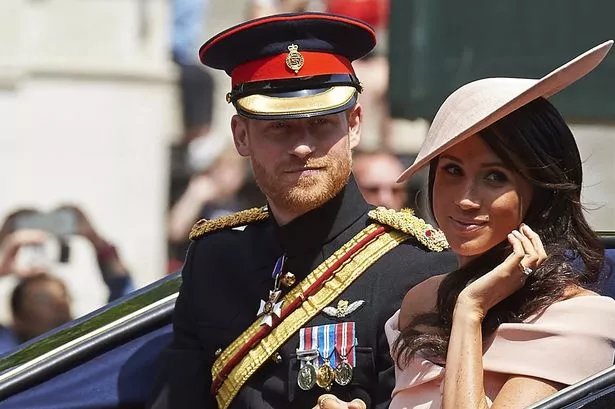In the whirlwind of public opinion surrounding Prince Harry and Meghan Markle, it seems the couple’s attempts to redefine their narrative have only led to self-inflicted wounds.
Recent commentary suggests that the real damage might not be to the British monarchy but rather to Harry and Meghan’s own reputations.
The American audience, once divided on their sentiments toward the couple, appears to be leaning towards a more critical view as the duo continues to air their grievances.
It’s no secret that Harry has been labeled as a despicable figure for his relentless efforts to tarnish the royal family’s image.
Critics argue that his actions are dragging the monarchy down to levels that even the Kardashians wouldn’t stoop to.
The question remains: has he truly succeeded in undermining the monarchy, or has he simply sabotaged his own credibility and that of his wife?
Initially, there seemed to be a 50/50 split among Americans regarding Harry and Meghan.
However, as they persist in voicing their complaints, their narrative has begun to sound increasingly petty.
Observers note that Meghan, who once aspired to climb the social ladder, may have used her marriage to Harry as a stepping stone into elite circles.
Some argue that her acting career, which never quite took off, was merely a prelude to her ambitions in the limelight.
The critique extends to Harry himself, whose recent book has raised eyebrows.
An early misstep in the book involves a quote he attributed to BrainyQuote, only to later discover it was from literary giant William Faulkner.
This blunder raises questions about his academic prowess and leaves readers feeling pity for him, as it indicates a lack of awareness that is hard to overlook.
Harry’s claims of victimhood throughout his life seem to miss the mark.
He recounts a childhood experience at Eton College, where he felt slighted by his brother for not wanting to hang out with him.
This is hardly a unique experience; siblings often seek independence in school.
Harry’s portrayal of sharing a room in a castle with 50 rooms as a hardship further distances him from the average person’s reality.
In another instance, he describes being the “spare” in the family, suggesting he was merely a backup for organ donations.
Such claims are met with skepticism, as they appear exaggerated and self-serving.
Critics argue that Harry’s narrative is less about genuine grievances and more about seeking revenge against his family, particularly under the influence of Meghan.
The book has also drawn ire for its treatment of family members, including Harry’s late grandmother and niece.
Many find it unacceptable that he would exploit personal family moments for profit, showcasing a level of pettiness that feels unbecoming of a royal.
The inclusion of sensitive details, such as his niece Charlotte’s tears over a bridesmaid dress, has left many questioning his motives.
While Americans generally enjoy drama, there’s a limit to how much betrayal can be tolerated.
Meghan’s calculated moves to align herself with influential figures like Tyler Perry hint at a deeper strategy to regain the spotlight in Los Angeles.
Yet, even in the land of celebrity, turning one’s back on family is a bridge too far.
The Kardashians, often seen as the epitome of fame-seeking behavior, maintain a sense of loyalty among their clan.
In stark contrast, Harry and Meghan’s actions suggest a willingness to sacrifice familial bonds for personal gain, which many find distasteful.
It raises the question: how far is too far when it comes to public feuds?
Critics have also pointed out Meghan’s shifting narrative regarding her racial identity.
Once silent about her background, she has seemingly embraced it only when it served her interests.
This strategic use of race for personal advantage has sparked outrage and disappointment among those who feel it perpetuates harmful stereotypes.
Harry’s portrayal of his late mother, Princess Diana, as a shield against criticism is equally troubling.
By invoking her memory, he attempts to deflect scrutiny while simultaneously throwing his own family under the bus.
This manipulation has not gone unnoticed, and many are left wondering how he reconciles his actions with the legacy of the mother he claims to honor.
Despite the chaos surrounding them, there is a sense that Harry is trapped in a web of manipulation spun by Meghan.
His unwavering belief in her narrative, coupled with a clear isolation from his family, paints a picture of a man deeply enmeshed in an unhealthy relationship.
As the dust settles, the question lingers: will Harry ever recognize the true cost of his choices?










